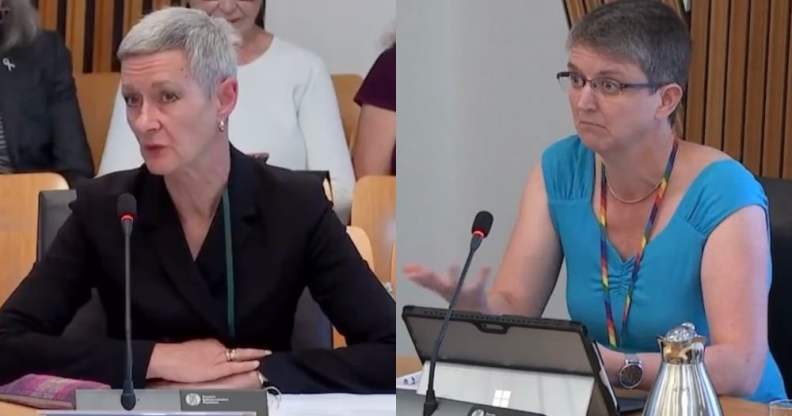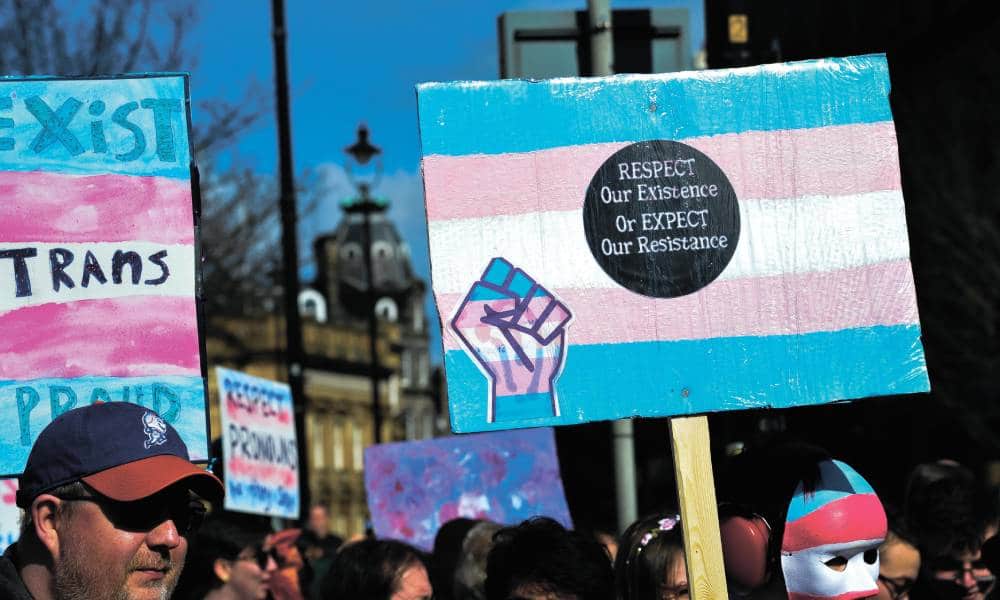UK’s so-called equalities watchdog can’t give one good reason why gender laws shouldn’t be reformed

EHRC bosses fumbled when pressed by Scottish MPs about why GRA reforms should be pushed back. (Screen captures via Scottish Parliament)
The Equalities and Human Rights Commission (EHRC) was left humiliated by Scottish MSPs as they grilled the watchdog over its opposition to reforms of gender recognition laws.
In February, the EHRC urged Scotland to bring planned reforms to the Gender Recognition Act (GRA) to a screeching halt to allow for further “consideration”.
The EHRC has similarly advised the British government to shelve banning trans conversion therapy. The government went on to leave trans people out of its ban altogether.
On Tuesday (17 May), EHRC officials all but crumbled before the Scottish parliament’s equalities, human rights and civil justice committee who responded with raised eyebrows to their claims.
The committee heard evidence from trans rights groups and the EHRC on the Gender Recognition Reform (Scotland) Bill, which is being considered by parliament.
The bill, introduced in March, would simplify the process by which a trans person can change their legal gender, such as by removing the invasive requirement for a medical diagnosis.
However, EHRC policy officer Melanie Field told MSPs that “more detailed consideration is needed” before the GRA is reformed.
“This is because of the continued law of uncertainty about the practical consequences for individuals and society of extending the ability to change legal sex from a defined group with a recognised medical condition who have demonstrated their commitment and ability to live in their acquired gender to a wider group,” Field said.
This is despite the government already conducting two lengthy and robust consultations. The vast majority of Scots also support the reforms.
EHRC bosses struggle to provide evidence as to why Gender Recognition Act reforms should be further delayed
Labour MSP Pam Duncan-Glancy pressed the EHRC if they had any “evidence”, any at all, on women being impacted by the introduction of self-identification laws in other countries.
In response, EHRC policy director Alasdair MacDonald floundered.
MacDonald said that the effects of self-ID are “still emerging” – again, this is despite how Ireland introduced self-ID in 2015, becoming the fourth country in the world to do so. The country had since streamlined the process for trans youth as well.
He struggled to provide any evidence of “abuse” within the gender recognition system.

Hundreds of members of the LGBT+ community marched through Dundee as part of Trans Pride Scotland 2019. Stewart Kirby/SOPA Images/LightRocket via Getty Images)
“Our emphasis has been less about any abuse of the system but rather understanding the implications of broadening access to this process and what that means for services and data collection,” he said.
Field also failed to provide examples of “abuse” and conceded no “formal” contacts with equivalent equalities bodies internationally have been made to discuss the issue.
Nevertheless, she said based on “informal” chats that “domestic context” matters and that the “debate in the UK is particularly heated and that is not replicated across other states necessarily”.
There are many reasons for this. Among them, the British press focuses almost daily on trans issues, multi-multi-multi-millionaire authors use their platforms to make misleading anti-trans remarks and the government manufactures “culture wars” out of trans people’s rights.
The “debate” is so toxic that the EHRC’s outgoing chair said that it is harming British society.
All the while, transphobic rate crimes have quadrupled since 2016 and that figure continues to rise. Almost one in four trans people have been threatened with or experienced transphobic violence. One in three employers would not hire a trans person.
The EHRC’s performance in Holyrood was “strange and defensive”, the Trans Legal Project, which provides advice on trans law, told PinkNews.
“There was no remotely convincing explanation of their volte-face on self-ID and at one point they seemed to suggest that the reason they’d withdrawn support for it was because of the toxic media furore,” the group said.
It was easy to poke holes in the EHRC’s remarks, the Trans Legal Project added. “They fudged a question around actively looking for any evidence of problems; something that you’d think they would be quite interested in,” it said.
“They also suggested that there had been no formal contact with human rights bodies in any country where self-ID had been introduced and elsewhere added that the EHRC Board does not actually ‘consult’ on matters of policy at all.
“Overall, it all felt rather vague and shambolic.”

